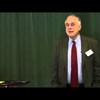peaks
Communication activity in social networks: growth and correlations
2011. European Physical Journal B 84:147-159. AbstractWe investigate the timing of messages sent in two online communities with respect to growth fluctuations and long-term correlations. We find that the
IF in search of new Director
Since Peter Hedström will be leaving the Institute on the 31st of August, the board is now recruiting his successor. This person will be taking on the responsibility of developing the future work of t

Equality for women, prosperity for all
Augusto Lopez-Claros, international economist currently on leave from his position at the World Bank to be Senior Fellow at Georgetown University, speaks about equality for women, drawing on his recen

Ethics and E-cigs. An Analysis and A Proposal
Daniel Wikler, Professor of Ethics and Population Health, speaks at a research seminar at the Institute for Futures Studies in Stockholm, suggesting a public health initiative to decrease the amount o
Kimmo Eriksson: Social norms and metanorms in 57 countries
Research seminar with Kimmo Eriksson, professor of mathematics/applied mathematics at Mälardalens högskola.RegisterAbstractMetanorms are norms about how to respond to norm violators. In the "InternatiJoin the seminar online or at the Institute for Futures Studies. If you plan to join on site, please check the box in the registration form. .
The not-very-rich and the very poor. Poverty persistence and poverty concentration in Sweden
Journal of European Social Policy, Published online before print June 17, 2015, doi: 10.1177/0958928715588707 We question the common description of poverty in Western countries as largely brief and tra
Trust, social movements, and the state
Journal of Trust Research Abstract A large literature has developed around the concept of political trust, but what exactly political trust is remains ambiguous. Some studies present it as a narrower ev
Brad Hooker: Fairness
Professor Brad Hooker, Philosophy Department, University of Reading. Consider the view that an individual behaves unfairly if, only if, and because (1) The individual treats people who are NOT relevantlAnd(2) The individual fails to treat people who ARE relevantly different in accordance with their relevant difference (e.g., needy/non-needy, someone who has a right against the individual/someone who doesn’t have a right against the individual, etc.).
Why Soft Power is Not So Soft
Venue: Institutet för framtidsstudier, Holländargatan 13, level 4, i Stockholm Welcome to a light brekfast before the seminar from 08.00. REGISTER HERE > Soft power played a critical role in the most s
Karin Bäckstrand: The Role of Non-state Actors in Global Climate Governance after COP22 in Marrakech
Professor in Environmental Social Science, Stockholm University ABSTRACTWhat is the roles of non-state actors, such as civil society, business, indigenous movements and cities, in global climate and th Conference of the Parties (COP15) in Copenhagen to COP22 in Marrakech, where Marrakech Global Climate Action was launched involving voluntary climate action commitments from more than 12 000 companies, investors, cities and regions, and civil society actors. Over this timeframe, we have seen a form of ‘hybrid multilateralism’ emerge, in which UN climate diplomacy blurs state and non-state participation in complex and intriguing ways with implications for the authority, legitimacy, and effectiveness of climate governance. This speaks, in different ways, to the transformed landscape of climate cooperation with a strengthened interface of multilateral climate diplomacy and non-state climate action and the potential roles, modes, and effects of non-state actors in the post-Paris period.








